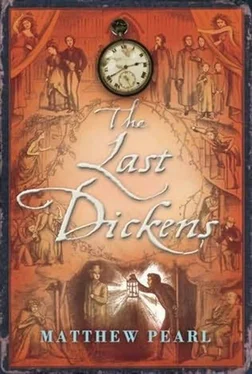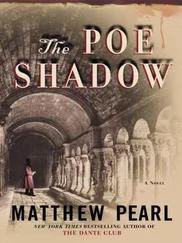As they spoke, they passed a Punch and Judy show. The wooden marionettes pranced across the small stage, Judy hitting Punch over the head with a cudgel. “I'll pay yer for a throwin’ the child out the winder!” shouted puppet Judy at her puppet spouse.
“Look again,” Osgood said. “There is something stranger than the noise, Miss Sand, and that is that London businessmen do not seem to notice the roar of the streets at all! To live in London, one must possess an iron concentration. That is how it remains the richest city in the world. Here we are,” Osgood said, pointing to a handsome brick building ahead displaying the CHAPMAN & HALL sign in the window.
This time when Chapman marched through the anteroom, he paused and took a few small steps backward upon seeing the guests on the sofa. The ruddy-skinned English publisher, with his strapping deportment and sleek dark hair combed into a flashy split across his wide head, looked the part of a sportsman and man of leisure, far more than that of a bookman.
“Say, visitors I see,” said Chapman, though his eyes were fixed not on both visitors, but on Rebecca's slender form. Finally, he resigned himself to also noticing the gentleman.
“Frederic Chapman,” Chapman announced himself, extending a hand.
“James Osgood. We met yesterday,” Osgood reminded him.
Chapman squinted at the visitor. “I remember your face vividly. The American publisher. Now, this little woman is…”
“My bookkeeper, Miss Sand,” Osgood presented her.
He took her hand gingerly in his. “You are most welcome into our humble firm, my dear. Say, you will come in with us to my office for my interview with Mr. Osgood, won't you?”
Osgood and Rebecca followed a clerk who followed Chapman in the procession into his private office. The room displayed some expensive books but a greater number of dead, stuffed animals: a rabbit, a fox, a deer. The frightful artifacts emitted a stale, bleak odor and each one seemed to stare in dumb loyalty only at Mr. Chapman wherever he moved. The office had a large bay window; however, instead of looking out onto London, it overlooked the offices and rooms of Chapman & Hall. Periodically, Chapman would turn his head to make sure his employees were hard at work. One of his harried clerks delivered a bottle of port to the meeting with a bow that was more like a spontaneous wobbling of the knees.
“Ah, excellent. I presume you and Mr. Fields have a wine cellar back in Boston,” Chapman commented as two glasses were filled.
“Subscription lists and packing supplies fill our cellar.”
“We have an extensive one. A game larder, too. Thinking of adding a billiard room-next time we'll play It is always a pleasure to see a colleague from the other side of the water.”
“Mr. Chapman, I suppose you have already thoroughly investigated what else might remain of The Mystery of Edwin Drood. We would benefit greatly if you'd share whatever intelligence you have gained.”
“Investigated? Why, Mr. Osgood, you speak like one of the detectives in all the new novels. You tickle my belly with your American notions.”
“I don't mean to,” Osgood returned seriously.
“No?” Chapman asked, disappointed. “But what would be investigated about it?”
Osgood, flabbergasted, said, “Whether Mr. Dickens left any clues, any indications about where his story was to go.”
Chapman interrupted with a satisfyingly hearty laugh, proving the alleged tickling. “See here, Osgood, old boy,” he said, “you are a laugh in the real American fashion, aren't you? Why, I'm perfectly content with what we have of Drood. Six excellent installments.”
“They are superb, I agree. But if I understand correctly, you paid quite a sum for the book,” Osgood said incredulously.
“Seventy-five hundred pounds! The highest sum ever paid to an author for a new book.” This he pointed out boastfully in Rebecca's direction.
“I would think your firm would wish to do whatever were possible to protect your investment,” Osgood said.
“I will tell you how I see it. Every reader who picks up the book, finding it unfinished, can spend their time guessing what the ending should be. And they'll tell their friends to buy a copy and do the same, so it can be argued.”
“In America, its unfinished state will bait all the freebooters, as they are called,” Osgood said.
“That scoundrel Major Harper and his ilk,” Chapman said, tipping his glass high and ingesting his port with a predatory swiftness as he glanced up at the congregation of animal heads. His hunting eyes, always roving, paused back on Osgood. “That's the thing you're worried about, isn't it?” he finally added. He leaned in toward Rebecca-not exactly unfriendly to Osgood's predicament but entirely lacking in interest relative to the pretty bookkeeper sitting across. “Say, I suppose your employer fought bravely in your War of Rebellion, didn't be? Lucky. Why, here we haven't any wars to speak of lately-small ones, but nothing worth suiting up for. Nothing to show oneself to the world as a man or to impress the ladies.”
“I see, Mr. Chapman,” Rebecca replied, refusing to shrink from the intensity of his attention.
“Remind me which battles you fought in, then, old boy?” Chapman asked, turning to Osgood.
“Actually,” Osgood said, “I had suffered the bad effects of rheumatism when I was younger, Mr. Chapman.”
“Shame!”
“I am all better now. However, it prevented any notion of being a soldier.”
“Still, sir, Mr. Osgood helped publish those books and poems,” Rebecca interjected, “that contributed to the enthusiasm and commitment of the Union to persevere in the cause.”
“What a pity not to have soldiered!” Chapman responded. “You have my sympathy, Osgood.”
“Thank you, Mr. Chapman. About Drood, ” Osgood said pointedly, changing the path of his persuasion. “Think of the value of our being able to better understand Dickens's final work. For the sake of literature.”
It seemed by the twinkle in his eye and the draw of his mouth that Chapman might start another laughing fit. Instead, his impressive frame bounded to his window and he put a fingertip against the glass. “Why, you sound like some of the young clerks out there. I can't tell them apart most of the time, they're rather indistinct, don't you think, Miss Sand?”
“I suppose I do not know, Mr. Chapman,” Rebecca began. “They seem dedicated to their work.”
“You!” Chapman's strong brow curled up on itself and he leaned out the door where some clerks were packing up a shipment of books into boxes.
A clerk nervously stepped inside the office. The other clerks all stopped what they were doing and waited on their colleague's fate.
“Say, clerk, can't you go more quickly than that packing the books?” Chapman demanded.
“Sir,” answered the clerk, “quite sorry, it's the smell that slows us down.”
“The smell!” Chapman repeated with an indignation suggesting he had been accused of personally originating the odor. He unleashed a series of furious expletives describing the clerk's incompetence. When the publisher finished, the clerk meekly explained that Chapman's latest addition to the larder room, a haunch of venison, had become too malodorous in the summer heat.
Chapman, putting up his nose as a test, relented, nodding. “All right. Put the venison on a four-wheeler, and I'll take it home for dinner,” he ordered.
Chapman had punctuated his insults by lighting a cigar, while the clerk was waiting for dismissal. When Chapman turned back to the young man again he looked on him as though he did not know where he had come from.
“You don't look very well!” Chapman remarked to the young man.
Читать дальше












